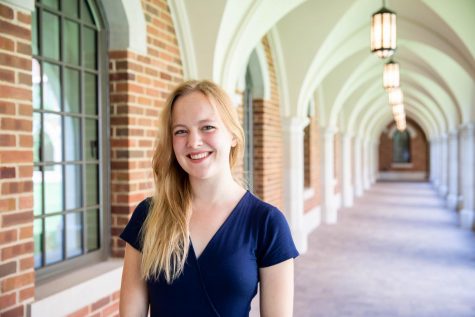In June, Dr. Lisa Fazio, Vanderbilt Assistant Professor of Psychology and Human Development, and a team of collaborators were the recipients of a $50,000 grant from the Knight Foundation for the purpose of combatting misinformation and increasing trust in journalism. The grant will fund a partnership between Vanderbilt and First Draft, a nonprofit coalition that provides guidelines on how to find, verify and publish content from the social web.
Fazio’s research concerns the illusory truth effect, or the tendency to believe information is true due to repeated exposure to that information, regardless of whether or not it is the truth. Particularly, her research has shown that this effect holds true even if the new information contradicts something previously known.
“We were interested in how people react when there’s false information in a fictional story,” Fazio said. “What we found was that people easily pick up that false information and would use it on a later test, even when it contradicts what they knew before reading the story. Reading false facts in a fictional story can change what you believe to be the true information.”
The project will expand upon First Draft’s existing project CrossCheck, an online verification collaboration project that came about during the February presidential elections in France, by using Fazio’s research to design ways to present information in a way that makes the truth more memorable.
“In this new grant what we’re really looking at is what happens when people read misinformation debunks, and what can we do to make sure that they walk away remembering the correct information rather than the misinformation,” Fazio said. “So, are there ways that we can phrase the debunks so that we don’t repeat the misinformation so that it doesn’t have this illusory truth effect, and what can we do to make the correct part of the story more memorable and make sure that’s what people walk away with?”
While the grant and project focus on stopping the spread of fake news, Fazio says there are other uses for her research.
“One place that we see a lot of impact is education more generally,” Fazio said. “How should we be designing textbooks and designing the learning experience so that people gain as much as they can from what they’re reading? How should we set up classrooms so that students learn as much as possible?”
Fazio added that individuals also have the power to avoid remembering false information by taking the time to consider what they read.
“One thing that we’ve recently found is that if you do have people slow down and reflect on how they know that something is true or false, then they can avoid this illusory truth effect,” Fazio said. “Repetition doesn’t increase the perceived truth of the statement if right before you judge its truthfulness, you think about how you know if that statement is true or false. So we can do this slower more thoughtful way of thinking that can help us to avoid false information, it’s just that our brain doesn’t like to do it so you kind of have to force yourself to slow down and think about it.”



